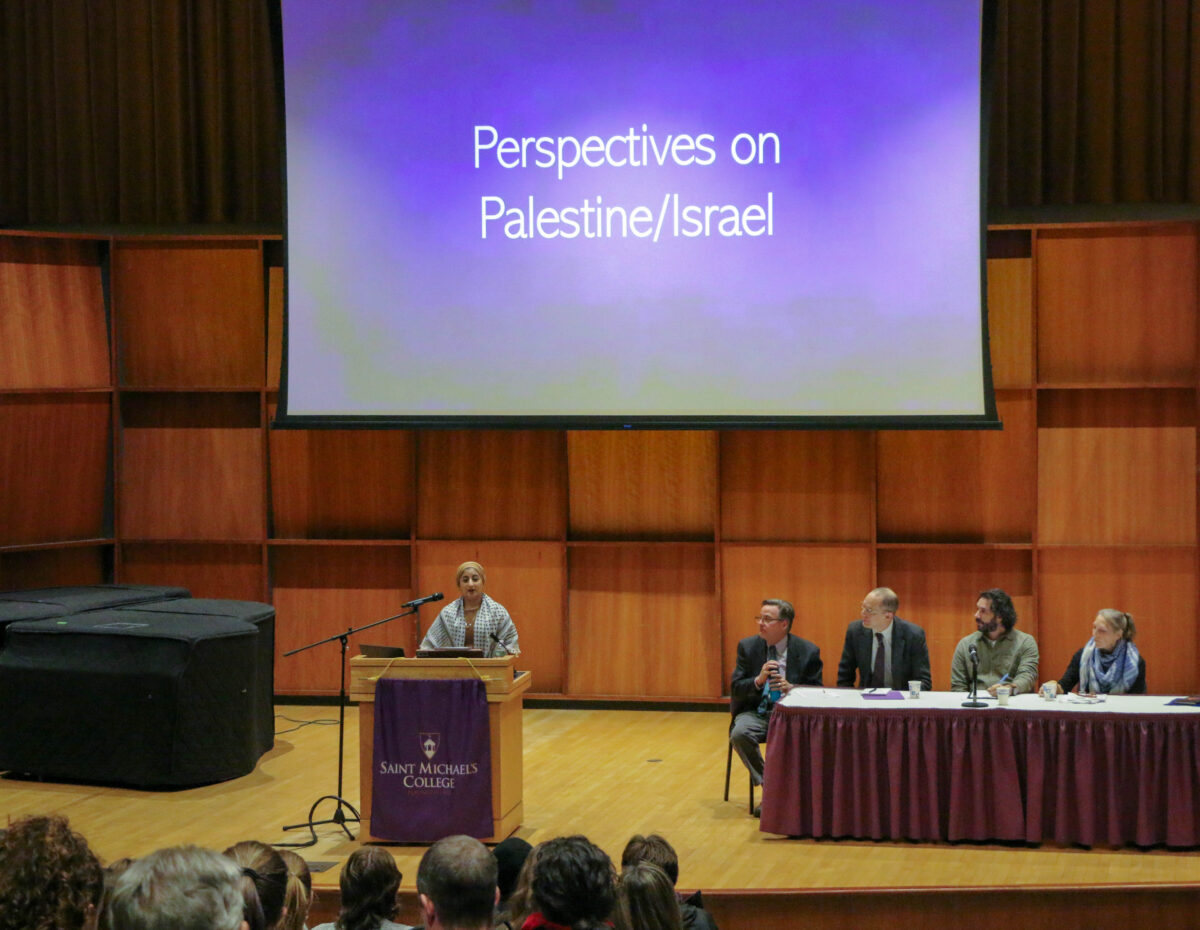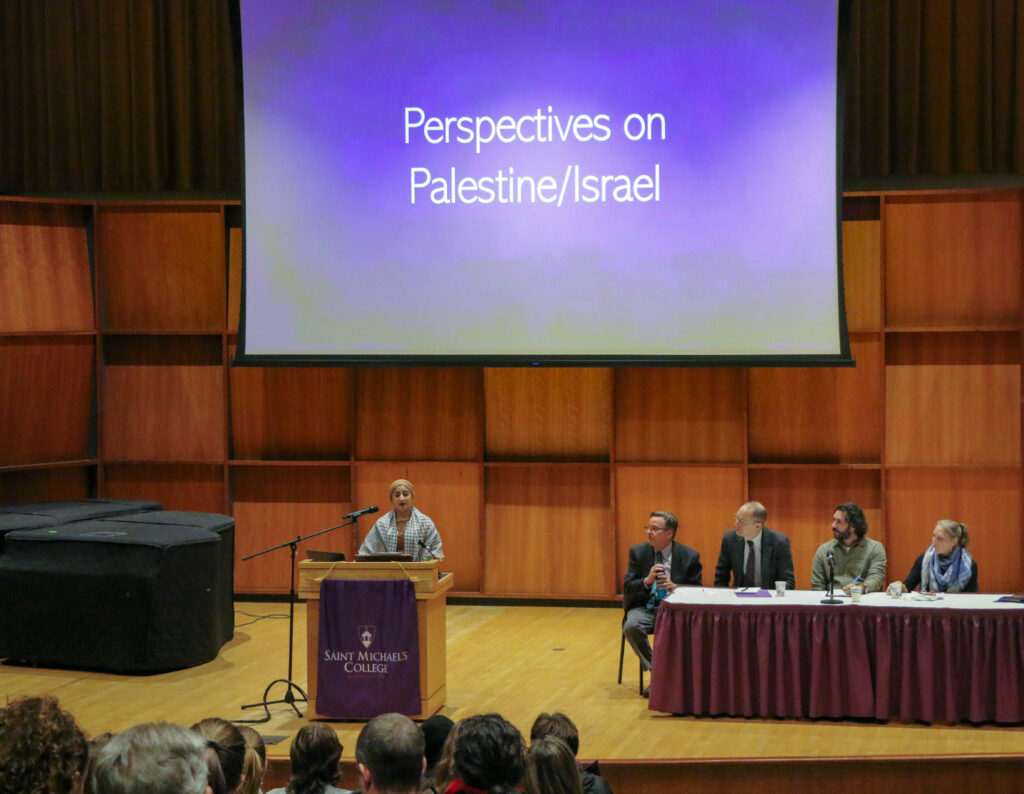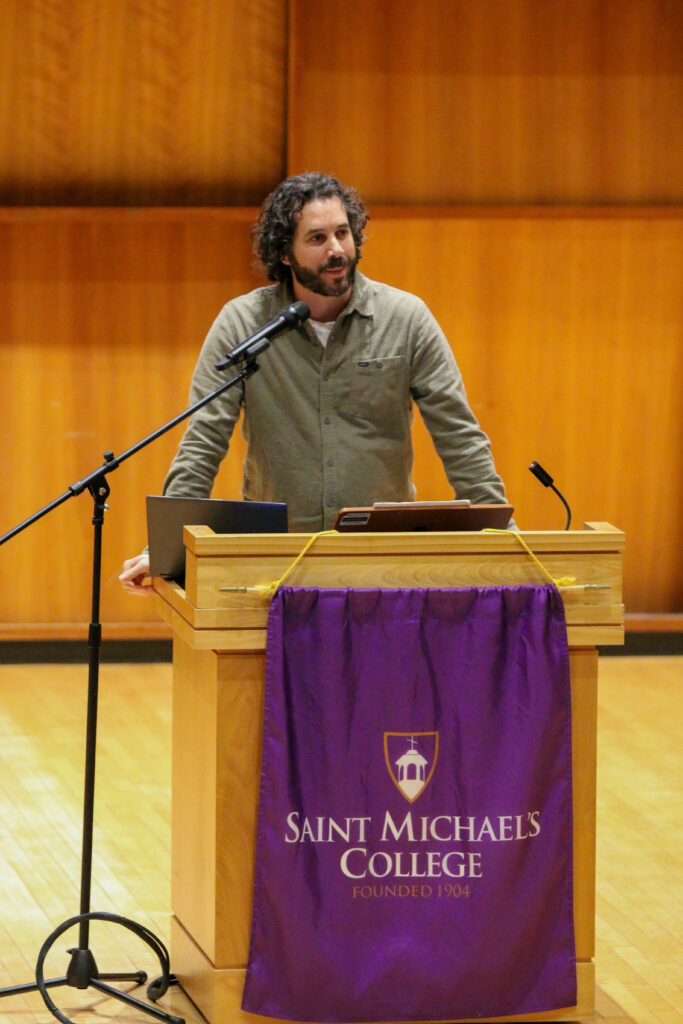
St. Michael’s College convenes panel to discuss the conflict in Israel and Gaza
Cassie Lathrope/Arts & Culture Editor/clathrope@mail.smcvt.edu

“Coming to this event, I’m uncomfortable, even frightened,” said Nathaniel Lew, Professor of Fine Arts. “I fear that our efforts tonight will make matters worse on our campus rather than better.”
On Thursday, Nov, 30 St. Michael’s College hosted a panel of five staff members to discuss different perspectives on the Israel/Palestine conflict to an audience of students and faculty.
Some students expressed their dismay that it had taken the college so long to respond to the conflict in the Middle East.
“I’m just wondering for one why it took so long because we’re over a month into this,” Alex Leandry ‘24 said, speaking from the floor.
“You know, lots of things are going on, lots of things happening, and it just took a while to get organized and get it together. I suppose better late than never,” said Jeffrey Trumbower, professor of Religious Studies and dean of Academic Affairs.
But Nora Beckwith ‘26 said it was important for the panelists to take the time needed to organize their thoughts and emotions. She believed if the panel had been done closer to the Oct. 7 events, it might have been less cohesive.
“I am patient with them because this issue is difficult to navigate and is extremely personal and emotional for many people,” said Thalia Guarnieri ‘26. “The staff took the time and energy from their own lives to educate us, and I am grateful for that.”
The panel was made up of Trumbower, Lew, Jason Hirsch, a professor of Sociology and Anthropology, Patricia Siplon, a professor of Political Science and director of Public Health, and Inaash Islam, a professor of Sociology. Dina Alsaffar ‘20, a peer tutor, also joined the panel during a question and answer portion, which required attendees to submit written questions in advance.
The speakers started by explaining their field of study, their ethnicity, and their ideology to ensure that the crowd was able to gain a better idea of the perspective that they brought, according to Trumbower.
Each speaker, beginning with Trumbower, spoke for a designated amount of time about the subject they pleased.
Trumbower is a biblical scholar focusing on early Christianity and Judaism. He explained the need for Saint Michael’s College to provide this panel due to the increase of Islamophobia and antisemitism throughout the country. He encouraged the audience to consider all perspectives, understand diverse identities and the importance of vocabulary, and recognize that this conflict is deeper than religion.
“I’m an American Jew, religious but not fully observant,” Lew said. “I’ve lived and worked in Israel and I taught at Tel Aviv University in 2019.”
Lew explained that he is a Zionist and believes Jewish people have the right to live and work in what he called the holy land. He said he is critical of the Israeli government for its treatment of Palestinians.
Lew discussed the adversity that Jewish people faced before Israel was declared a nation in 1948. He explained in brief the 1948 and 1967 Israeli-Arab Wars.
“Given the history of massacres, pogroms, and genocide committed upon us, we carry a deep paranoia. We suspect that our acceptance everywhere is provisional and may be murderously revoked at any moment,” Lew said. “For many Jews…Israel is the one place where the fear diminishes.”

Lew believed Palestinians should have their own state. “This is the only morally acceptable outcome to imagine and build a world in which both communities abandon violence, oppression, and resistance and learn to live together,” Lew said.
The second speaker was Jason Hirsch, instructor in sociology and anthropology. Hirsch is Ashkenazi Jewish and he said as an anthropology professor, he seeks to question and understand how people live and “make sense of their worlds.”
Professor Hirsch informed the audience about a Jewish socialist group called the General Jewish Labor Federation. This group is also known as ‘the Bund’ in Yiddish, for short.
“Against the Zionist notion that Jews could only be safe with their own army, the Bundists argued that Jews, like all peoples, had rights to safety and freedom wherever they were,” said Hirsch.
Hirsch explained that the Bundists did not disagree with Jewish people moving to Palestine for refuge. However, by setting up the nation-state that is now Israel, the Jewish people “reproduced the persecution that they had historically faced against the existing Palestinian population,” Hirsh said. “The safety of one people need not be pitted against the safety of another.”
The third panelist to speak was Professor Trish Siplon. Siplon traveled to the West Bank and Jordan in 2010, 2011, and 2012. She lived in Jordan City and taught at the University of Jordan for a year.
Professor Siplon spoke about the imbalance of power between Israel and the Palestinian territories in terms of the military, land, water, and autonomy. She claimed Israel is more powerful in each category, which limits the courses of action available to Palestinians.
“If we want to talk about peace, we also have to talk about justice. And if we want to find the pathway for that justice, the pathway is through equalizing power,” Siplon said.
The final panelist to speak was Professor Inaash Islam, who is Pakistani and Muslim. She is a scholar of race and studies the war on terror.
“I am seeing and witnessing the ethnic cleansing of people who look like my father, look like my mother, who look like my siblings, and so I am in grief,” Islam said.
Islam claimed silence equates to compliance, supported by Western mainstream media. She gave examples of what she called the Western media’s lack of proper vocabulary and sentence structure that, she claims, leans toward the side of Israel, such as the usage of the word “war,” miscrediting Palestinian death tolls, and using differing terms when referring to Israeli lives and Palestinian lives.
“They’re human beings, and to dehumanize a population is to make their mistreatment, their torture, and decimation acceptable, justifiable, and palatable,” Islam said.
Peer tutor Dina Alsaffar said she asked to write for The Defender, to “talk about these issues in a way where it’s coming from an Arab voice, a Palestinian voice, or a Jewish voice, to get people involved. However… things were not as I’d hoped for it to go.”
According to the Defender writing staff, the newspaper is a student newspaper for student voices only. The Defender has made an effort to allow students to share their perspectives.

